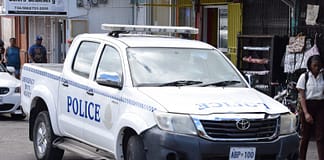
Scientists investigate the link between Antigua’s marine microbiome and coral reef resilience
Last year, at a time when coral reefs were decimated by a marine heatwave, the Elkhorn Marine Conservancy’s (EMC) scientists also observed two deadly diseases spread through Antigua’s coral reefs.
The outbreaks, amongst other recent coral health issues, have prompted EMC to investigate the many facets that make corals and their environment more resilient, including the marine microbiome.
The microbiome–or the community of microorganisms such as bacteria, archaea, fungi, and protists–in seawater plays a crucial role in ecosystem function, including nutrient cycling, decomposition of organic matter, and maintenance of water quality.
Much like the microbiome of the human gut, which is increasingly recognized as a major driver of immune system function, the microbial communities in seawater can influence the immune systems of corals as well as other marine organisms.
The EMC recently had the honour of collaborating with Dr. Amy Apprill, Associate Scientist from the Woods Hole Oceanographic Institution (WHOI) in the United States, to collect data on the microbiology of Antigua’s coastal marine ecosystems and potential links to coral reef health.
During this collaborative research initiative, Dr. Apprill and scientists from the EMC and National Parks Authority collected water quality samples at 25 sites around the south and east coasts of Antigua that vary in terms of exposure to potential human impacts.
Physical parameters such as pH, dissolved oxygen, and turbidity were measured in real time, water samples and microbial biomass were collected and transported frozen back to the U.S. where they will be analysed for microbial abundances and diversity as well as nutrient content.
At six of these sites, tissue samples were also collected from both healthy and diseased colonies of elkhorn coral (Acropora palmata).
These samples will also undergo microbial analysis and potential links to local water quality will be investigated.
The results obtained from this study will help EMC, Antigua and Barbuda National Parks Authority and other stakeholders understand local water quality issues, inform management recommendations, and identify optimal locations for future coral restoration efforts. The data collected will also contribute to a regional dataset that Dr. Apprill is developing to better understand links between water quality, microbiology, and coral reef health in the Caribbean.
EMC remains committed to advancing scientific knowledge and employing data-driven strategies to protect and enhance the marine environment in Antigua and Barbuda.
This collaboration with WHOI reinforces our dedication to sustainable conservation practices and informed decision-making for the benefit of our oceans and communities.
This work was conducted under CITES permit No. AF24/03/001 and Govt. of Antigua & Barbuda Access and Benefit Sharing Agreement No. 2 of 2024.
Elkhorn Marine Conservancy is an innovative non-profit dedicated to enhancing the resilience and stewardship of Antigua and Barbuda’s marine ecosystems through restoration, research and community engagement.
Woods Hole Oceanographic Institution is dedicated to advancing knowledge of the ocean and its connection with the Earth system through a sustained commitment to excellence in science, engineering, and education, and to the application of this knowledge to problems facing society.
Advertise with the mоѕt vіѕіtеd nеwѕ ѕіtе іn Antigua!
We offer fully customizable and flexible digital marketing packages.
Contact us at [email protected]
















